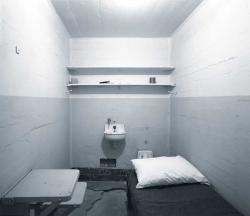Man Who Served 10 Years for Crimes He Did Not Commit Delivers Keynote at Wrongful Convictions Forum
David Shephard was sentenced to 30 years in prison for crimes he did not commit. He spent a decade behind bars before he was able to prove his innocence. Last November, as part of a Wrongful Convictions Forum sponsored by the Bonner Center and the College’s Liberal Learning Program, Shephard detailed the events that led to his conviction and imprisonment, and explained how he regained his life through post-conviction DNA testing.

by Kaitlin Tambuscio ’10
While some people associate Christmas Eve with family gatherings, presents, and holiday cheer, the day has a different connotation for David Shephard.
 On December 24, 1983, a college student was raped and kidnapped near Hillside, NJ. The woman was found near Newark Airport’s north terminal. Shortly after, Shephard, an airport employee at the time, was approached by local police and brought in to “talk about a stolen car in Hillside”—or so he was told by the officers. The interrogation quickly turned to Shephard being questioned about the rape and kidnapping of the young woman.
On December 24, 1983, a college student was raped and kidnapped near Hillside, NJ. The woman was found near Newark Airport’s north terminal. Shortly after, Shephard, an airport employee at the time, was approached by local police and brought in to “talk about a stolen car in Hillside”—or so he was told by the officers. The interrogation quickly turned to Shephard being questioned about the rape and kidnapping of the young woman.
Shephard was eventually convicted on charges of rape, robbery, weapons violations, and making terroristic threats. He was sentenced to 30 years in prison—for crimes he did not commit. It would be a decade before he was able to prove his innocence.
“I was scared,” Shephard told a TCNJ audience in November, in reference to his original interrogation by police. “I didn’t know what they were talking about. I didn’t know what to say. I didn’t know the right thing to say, the wrong thing to say.”
Shephard was on campus to share his story as part of a Wrongful Convictions Forum, which was sponsored by the Bonner Center and the College’s Liberal Learning Program. As the keynote speaker, Shephard detailed the events that led to his conviction and imprisonment, and explained how he regained his life through post-conviction DNA testing.
In 1992, Shephard filed court papers requesting that all evidence which was used against him at trial and contained DNA be released for testing. The prosecution agreed, and the results of the tests proved that Shephard had not been the perpetrator of the crimes for which he had been serving time. Finally, in 1995, he was released.
“Those years in prison were the worst years of my life. They were like a nightmare I couldn’t wake up from,” Shephard told those in attendance at November’s event.
Shephard’s traumatic experience continues to affect every aspect of his life, even 13 years after being exonerated, he said. Today he is a family services worker in Essex County, and works to help people qualify for public assistance, but he is forever changed by the 10 years he served in prison.
“I’m more insightful now than I was before. I don’t take anything at face value,” said Shephard.
Also, family was, and always has been, Shephard’s top priority. “There were times when I lost all hope and faith. If it wasn’t for my son and my family, I don’t know what would’ve happened.”
As part of the November forum, students from Adjunct Professor Lynn Goedecke‘s class, Wrongful Convictions: Causes and Remedies, presented information on how wrongful convictions can occur. They also detailed what states, specifically New Jersey, are doing to prevent them. For more on information on Goedecke’s class, see the spring 2007 issue of TCNJ Magazine.
Posted on January 13, 2009

